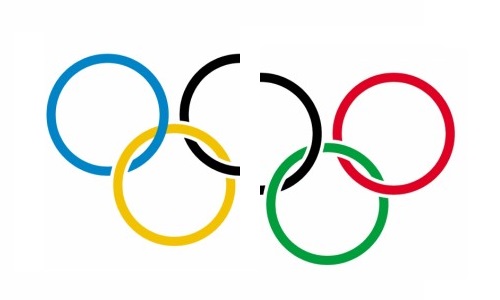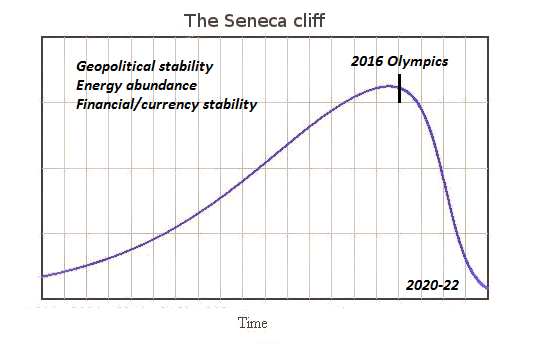What Are the Odds that the 2020-2022 Olympics Will Be Cancelled?
August 23, 2016
It's tough to pay for an Olympics when 95% of your supposed "wealth" has vanished.
In the modern era (1896-present), the Olympics have only been cancelled in wartime: 1916 (World War I), 1940 and 1944 (World War II). But world war is not the only circumstance that could derail the Olympics; a global crisis in energy, finance or geopolitics could send the risks and costs of the Olympics beyond the reach of most participants.

The key to understanding the odds of an Olympic cancellation is Liebigís Law of the Minimum, which states states that "growth is controlled not by the total amount of resources available, but by the scarcest resource."
As I have outlined elsewhere, the three resources that will become increasingly scarce globally going forward are:
1. Geopolitical stability
2. Energy abundance (i.e. abundant and affordable to the bottom 95%)
3. Financial/currency stability
A global scarcity of any of these three could sink the Olympics in 2020 and 2022. I've discussed the geopolitical, financial and resource risks in four recent posts:
The Odds of a Global Food Crisis Are Rising
Here's Why Wages Have Stagnated--and Will Continue to Stagnate
The Ultimate Long Game: Autarky and Resilience
The current confidence that everything will remain stable for years to come is based on a misleading extrapolation of current trends. Just because the global status quo has managed to maintain a facade or normalcy for the past eight years does not mean the New Normal (central banks pumping $180 billion a month into the global financial system to keep it afloat) is identical with the pre-crisis Old Normal.
Seneca's Cliff offers a more accurate model of reality: everything stays the same until it doesn't. The slide down is much faster and more abrupt than the steady advance to the cliff's edge:

The reality is the status quo has been forced to increase its interventions just to maintain the steady-state facade of normalcy. This constant increase of resources being devoted to prop up an unsustainable system is not consequence-free; the effort generates unintended consequences and increases the systemic risks.
The status quo must then ramp up its interventions and manipulations to compensate for the strains and risks breaking through the carefully managed facade of normalcy.
War is not the only possible disruptor of the 2020-2022 Olympics. Geopolitical tensions could rise to the point that boycotts effectively gut the Olympics. Global disruptions of energy (severe shortages and soaring costs) could put the Olympics out of reach for many participants--and of course these two risks are connected. Energy shortages and geopolitical conflicts go hand in hand.
A funny thing happens in a severe currency crisis: 95% of the phantom wealth suddenly disappears. The value of fiat currencies is established by a number of factors, but the primary one is demand for the currency, which is tied to participants' trust that the currency will retain its current value (or appreciate) going forward.
Once that trust is lost, the downward spiral creates panic selling.
In the current narrative, central banks can always "save the day" by printing money
or opening the floodgates of unlimited credit.
In other words, a loss of faith in a currency cannot be reversed when faith in the
central bank's magical powers has also been lost. The dramatic decline in the
purchasing power of Venezuela's
currency offers a modern-day example of what happens to phantom wealth in a currency
crisis.
It's tough to pay for an Olympics when 95% of your supposed "wealth" has vanished.
To save face, the host nation may attempt a severely truncated Olympics
with a few participants and mostly empty venues, but the reality will be visible to all:
it would have been better to cancel the Olympics and avoid the embarrassment of a
failed show crippled by scarcities.
What are the odds that the 2020-2022 Olympics will be cancelled (or completely
distrupted)? A lot higher than most people think.
Of related interest:
Alice Friedemann: When The Trucks Stop Running
Stephanie Pomboy: A Grim Outlook for the Economy, Stocks
Jeffrey Snider: All Signs Point To Systemic Reset
NOTE: Contributions/subscriptions are acknowledged in the order received. Your name and email
remain confidential and will not be given to any other individual, company or agency.
Thank you, Bob Z. ($125), for your outrageously generous contribution
to this site--
I am greatly honored by your steadfast support and readership.

My new book is #9 on Kindle short reads -> politics and social science:
Why Our Status Quo Failed and Is Beyond Reform ($3.95 Kindle ebook,
$8.95 print edition) For more, please visit the
book's website.

Discover why Iím looking to retire in a SE Asia luxury resort for $1,200/month.